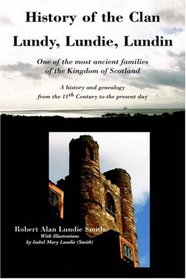Search -
History of the Clan Lundy, Lundie, Lundin: One of the Most Ancient Families of the Kingdom of Scotland: a History And Genealogy from the 11th Century to the Present Day
History of the Clan Lundy Lundie Lundin One of the Most Ancient Families of the Kingdom of Scotland a History And Genealogy from the 11th Century to the Present Day
Author:
The history of many of the great houses and families of Scotland are well documented in literature, and by clan associations and individuals on the Internet. The family of Lundie (Lundy, Lundin, Lundyn) is described, by Sir Robert Douglas in his "Baronage", as one of the most ancient in Scotland; its history however up until now is almost undocu... more »
Author:
The history of many of the great houses and families of Scotland are well documented in literature, and by clan associations and individuals on the Internet. The family of Lundie (Lundy, Lundin, Lundyn) is described, by Sir Robert Douglas in his "Baronage", as one of the most ancient in Scotland; its history however up until now is almost undocu... more »
ISBN-13: 9781845300234
ISBN-10: 1845300238
Publication Date: 9/30/2005
Pages: 520
Rating: ?
ISBN-10: 1845300238
Publication Date: 9/30/2005
Pages: 520
Rating: ?
0 stars, based on 0 rating
Publisher: Grimsay Press
Book Type: Paperback
Other Versions: Hardcover
Members Wishing: 1
Reviews: Amazon | Write a Review
Book Type: Paperback
Other Versions: Hardcover
Members Wishing: 1
Reviews: Amazon | Write a Review
Genres:




